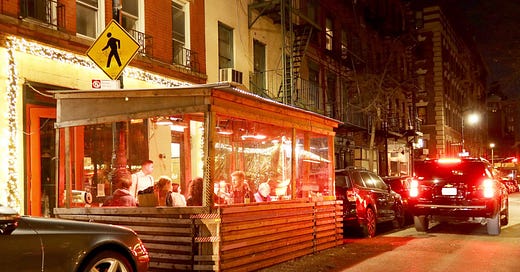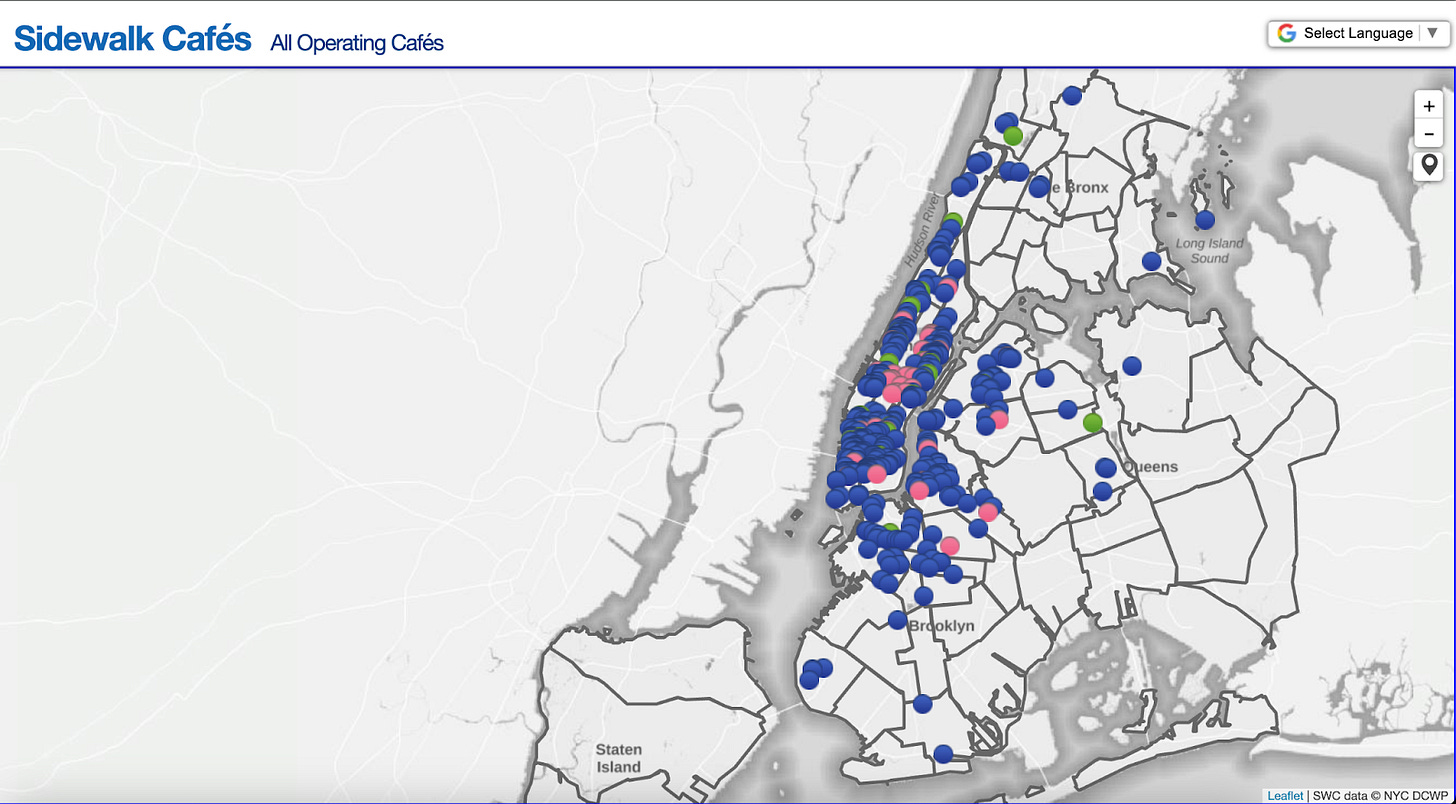Where did all the sidewalk cafes go?
How switching from a blacklist regulatory regime to a whitelist one prevents development
In the summer of 2020, as COVID-19 raged on and local restaurants, cafes, and businesses fought desperately to remain open, the city allowed for many parking spots and roadsides to be taken over by sidewalk sheds. These little huts, often constructed of wood or aluminum, provided outdoor seating for diners and transformed the streetscape. For a little while, certain streets throughout the city resembled the sidewalk cafes renowned in Paris, and even through the end of COVID-19 restrictions, sidewalk sheds remained and brought a vibrancy found at the core of a walkable city.

Just as important, they provided an essential space for restaurants and bars to seat customers, opening the revenue stream for businesses operating on slim margins and often working with minimal dining space.
In August 2023, the New York City Council passed Local Law 121-2023 and established a new regulatory regime for sidewalk cafes in the city. While Local Law 121-2023 did not prohibit roadway or sidewalk sheds, it set a new application process and regulations so burdensome that it has effectively ended their existence. The regulations involve costs extremely burdensome to small businesses, and even those willing to spend the time and money applying to keep their sheds are faced with non-response. Regulating these sheds to ensure they meet health & safety standards and ensuring that sidewalks remain available for pedestrians to pass through is important. But is the current regulation imposed by Local Law 121-2023 the best answer?
From a peak of 13,000 sheds during the COVID-19 pandemic, about 4,000 restaurants have re-applied for new sheds under the application system set-up by city council. As of March 26th, DOT’s Dining Out NYC map shows only 47 issued licenses - about 0.4% of the amount during the pandemic. According to the NYC Department of Consumer and Worker Protection’s Sidewalk Cafe Map, there were 432 actively licensed sidewalk cafes in June 2020. This makes clear that there was certainly a demand for sidewalk cafes in the pre-pandemic era, and that existing regulations were actually less restrictive than the new ones. Demand for sidewalk cafes has also picked up greatly since early 2020.
Either through restaurants realizing the revenue potential of sidewalk cafes, changing consumer habits, or increasingly high costs and narrow margins necessitating an expansion of seating, these outdoor cafes are desired. Thus the decline seems two-fold: only a third of businesses that previously had sheds have applied for new ones, and due to the backlog at DOT nearly none of these have been approved. While DOT insists that all applications will be reviewed on time and has recently allowed businesses to open sheds as long as they submit their applications, all this uncertainty can’t be desirable and presents added unnecessary risk.
In this post, I will do three things:
Break down how Local Law 121-2023 regulates sidewalk cafes
Explain why these new regulations prevent most businesses from having sidewalk cafes at all
Provide next steps for those looking to support outdoor dining
Why did the City Council pass Local Law 121-2023 and what does it require?
The primary goal for Local Law 121 of 2023 was to establish a permanent outdoor dining program, as up until August 2023 the sidewalk sheds were regulated under temporary COVID-19 measures. As one of the bill’s primary sponsors Keith Powers noted, “Outdoor dining has brought new life to the city. It has allowed New Yorkers to enjoy their favorite establishments and socialize in a safe and healthy manner. It has also provided an essential way to keep our favorite restaurants, bars, and cafes in business. New York should learn lessons from this moment and extend outdoor dining permanently.”
The City Council intended to unify these temporary provisions by repealing subchapter 6 of chapter 2 of title 20 of the administrative code, where sidewalk cafe regulations were based, and establish new procedures and requirements under title 19 of the Administrative Code (19-160 through 19-160.6).
The main concerns with the pre-existing regulation around sidewalk sheds, according to the city council meetings transcripts and legislation text, are as follows:
Health/Safety - rats and trash accumulating under sheds
Accessibility - blocking pedestrian traffic and ADA access
Neighborhood Character - ensure sidewalk cafes maintain existing neighborhood character
In accordance with these concerns, Local Law 121 enacted a new system of providing sidewalk cafe licenses. To obtain a license, a business now has to submit an application to DOT, ensuring roadway or sidewalk structures comply with a long list of criteria involving structure size, materials, design, and maintenance. Businesses must also pay a fee of $1,050 each time they wish to apply or renew their license, which is required every 4 years.
The law tasked DOT with approving all applications and requiring sheds to be safe, attractive, and consistent with the city’s streetscape. DOT also must notify the relevant community boards and council members for public hearings to be held, with notices for such hearings published 15 days prior to the hearing.
How do the new regulations actually restrict sidewalk sheds?
With the new regulations, the city adopted a restrictive - rather than permissive - licensing structure where the default is that no sidewalk cafes are allowed and permission must be obtained for each individual business. Sidewalk cafes applications are forced to endure a similar lengthy review process to ULURP (Uniform Land Use Review Procedure) - reviews are required by community boards, council members, and the comptroller in addition to DOT approval. All applications are subject to city council and mayoral review, further expanding the range of involved parties.
This entire process greatly lengthens the time it takes from submission of an application to final approval. Notices for public hearings of a new application must be published 15 days prior to the hearing. Community boards have 40 days to submit their recommendation. Each of these steps adds weeks, if not months, to an approval process for cafes that are not even allowed to remain up year-round, but only from April 1 to November 29. Enforcing a temporary allowance period for the structures also means additional costs for businesses having to construct, deconstruct, and store their sheds each year. Many businesses may not bother to endure a procedure that takes just as long as the allowed duration the seating area itself can remain.
Involving both community boards and the City Council in the approval process for every single shed has led to the strain of NIMBYism that has restricted housing development to occur here too. With the City Council now involved in the approval process, we have seen repeated instances of applications being denied for all sorts of reasons, including “quality of life issues”. Many of these sidewalk cafes were beloved by many in their community, but can now be blocked or ordered to be taken down by any councilmember.
What can be done next
On any given street in New York City, space must be shared between cars (including trucks and package carriers delivering necessities), bicycles, pedestrians, and businesses with their variety of store fronts and sidewalk seating. For the past 70 years or so, the majority of this sidewalk space has been given to cars in the form of roads and street parking, with all the rest fighting over the limited remaining sidewalk.
Support for sidewalk sheds has been widespread among both businesses and NYC residents. Just take a look at the 446 comments on DOT’s notice of adoption for the Dining Out NYC program.
Sidewalk cafes should be allowed by default as long as they comply with health, safety, and accessibility regulations. Sheds deemed in violation of regulations may still be removed and businesses fined for such violations - but restaurants operating in good faith and in compliance should not be subject to such a lengthy and costly approval process.
For anyone reading this, you do not have to be in a position of power to have a voice here either. There are hearings being held on new sidewalk cafe applications by community boards across the city, and petitioning your board members to approve is important. The City Council is also holding hearings on applications, and reaching out to your councilmember or signing petitions to show support has an impact too.






